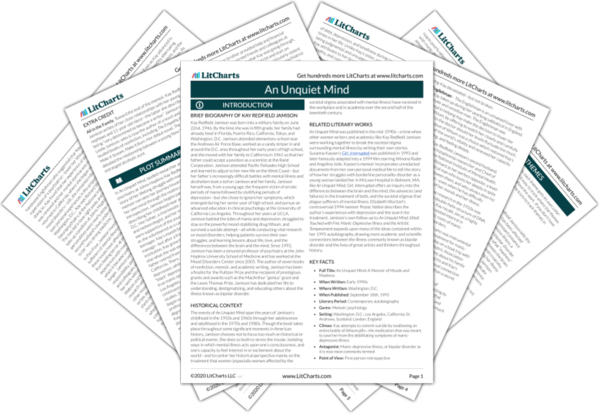Summary
Analysis
Just before leaving Los Angeles for Washington, Jamison received a terribly unpleasant letter from a woman who saw an announcement that Kay was going to give a lecture with the word “madness” in the title and objected heavily to its use. The woman wrote that Kay had “no idea at all” what it was like to suffer from mental illness and was just “one more doctor […] climbing […] up the academic ranks by walking over the bodies of the mentally ill.” The letter shook Kay—but also forced her to reckon with the ways in which even she was perpetuating harmful language surrounding mental illness.
This passage demonstrates a key moment in Jamison’s life. She began to realize that by hiding her personal connection to manic-depressive illness, she was misrepresenting herself and her work. Receiving this letter forced Jamison to question the choice she’d made to keep the personal and the professional separate, making her commit to acting as a more vocal advocate for the mentally ill.
Themes
Jamison suggests that words such as “bat,” “loon,” “wacko,” and “fruitcake,” when leveled against those suffering from mental illness, can not only injure an individual emotionally, but can also lead to continued stigma and discrimination against the mentally ill throughout society. At the same time, Jamison writes, simply expunging these words from the modern lexicon alone will not do anything for the stigmas surrounding mental illness. There is a need for more than a linguistic reckoning, but rather a profound change in how the public perceives the mentally ill.
Jamison wants to make her readers aware of the tensions that exist in the mental health and psychiatric communities. She knows that simply eliminating the use of offensive words isn’t quite enough—but she posits that it’s at least a start, and a way for individuals outside of the community to help end societal stigma against those with mental illnesses.
Themes
Jamison writes about the use of the term “bipolar disorder” to describe what she and the rest of the psychiatric community have called manic-depressive illness. Many patients feel that manic-depressive illness is a poor term for what they experience—Jamison herself, however, balks at the word “bipolar” and finds it offensive in how it minimizes her experience of having a mood disorder. She questions whether “bipolar” is even a medically accurate term, and she suggests that to separate mood disorders into bipolar and unipolar categories is to ignore important science about the dangers of segregating the fluctuating states of mind that accompany mood disorders.
Jamison uses this passage to explore the complex and deeply personal issues surrounding the language society uses to describe mental illness. Jamison understands that while some people feel bipolar is a more accurate term, it doesn’t resonate on a personal or experiential level with her. She doesn’t necessarily oppose the change in language—but she wants people in the scientific and medical communities (as well as lay people) to be aware of how language has the power to further or mitigate stigma.
Themes
Ultimately, Jamison suggests, destigmatizing mental illness will not come from a simple change in the language society uses to refer to conditions and illnesses—changes in public education efforts, advances in genetic and biological research, and legislative actions (such as the Americans with Disabilities Act) could all do far more for the sufferers of manic-depressive illness and related disorders. She celebrates the mental health advocacy groups that do important work in educating the public, the media, and the government, and suggests that they have helped Kay herself and untold sufferers like her to regain power over discussing their own experience of “the human condition.”
Jamison knows that there is a long way to go in terms of destigmatizing mental illness and taking the necessary steps to make the world a safer, more equitable place for all—but she believes that society has the power to do what needs to be done. Jamison is optimistic about the strides yet to be made in terms of advocacy, legislation, and increased awareness.
Themes
Get the entire An Unquiet Mind LitChart as a printable PDF.













